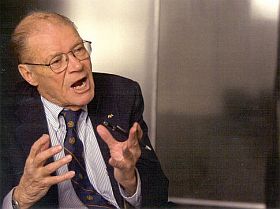


Top Stills

Vi forbinder bestemte historiske begivenheder med bestemte personer, de er vores hovedpersoner før, filmene gør dem til det. Dobbelt betydningsbærende. De tre stills i Filmkommentarens hoved kunne være de to bloggeres personlige bud på tre sådanne scener med tre særlige medvirkende i tre uomgængelige film. / The three stills above are from films strongly appreciated by the two bloggers, in important scenes and with main characters in the films as well as in specific periods of our history.
1) Vietnamkrigen erindret af Robert McNamara under sindrigt pres i Errol Morris: The Fog of War (2003). ”Det er måske Morris’ berømte spejlarrangement ved interviews, som gør det. McNamaras blik, fortælling og tolkning plus hans intensitet former uafrysteligt min opfattelse af verdenshistorien den sidste halvdel af 1900-tallet.” (Allan Berg Nielsen i filmkommentaren.dk) / The Vietnam War as it was recalled by Robert McNamara, pushed by Errol Morris in “The Fog of War” (2003). “Maybe it is the famous mirror arrangement at the interviews that does it. The glance of McNamara, his storytelling, his interpretation plus his intensity shakes completely my look at world history during the last half of the 20th century.”
2) Militærkuppets fly mod præsidentpaladset iagttaget af Salvador Allende omgivet af livvagter i Patricio Guzman: The Battle of Chile (1975-1979). / The attack on La Moneda watched by Salvador Allende surrounded by his guards in Patricio Guzman’s “The Battle of Chile” (1975-79). “How could a team of five – some with no previous film experience – working with one Éclair camera, one Nagra sound recorder, two vehicles and a package of black-and-white film stock sent to them by the French documentarian Chris Marker produce a work of this magnitude?” (Pauline Kael in The New Yorker).
3) Den nye tjekkiske politiske kultur levet af Vaclav Havel i blot en af utallige værtshusdiskussioner i Pavel Koutecký og Miroslav Janek: Citizen Havel (2008). ”I 12 år fulgte Pavel Koutecký og hans hold Havel, i det offentlige og i det private rum og ud af det er kommet en helt vidunderlig, morsom og gribende fortælling om en helt vidunderlig mand, der hele vejen igennem beholder sin integritet og viser at den ærlige og kærlige mand naturligvis ikke kan undgå at løbe ind i problemer, når han skal have med politik at gøre.” (Tue Steen Müller i filmkommentaren.dk) / The new Czech political culture as it was lived by Vaclav Havel in one of many café discussions in Pavel Koutecky and Miroslav Janek’s Citizen Havel (2008). “For 12 years Pavel Koutecky and his crew followed Havel, in public and privately, and from that material a wonderful film has been made, funny and touching it is about a fine man, who keeps his integrity and shows that an honest and loveable man of course must run into problems when he enters politics.”